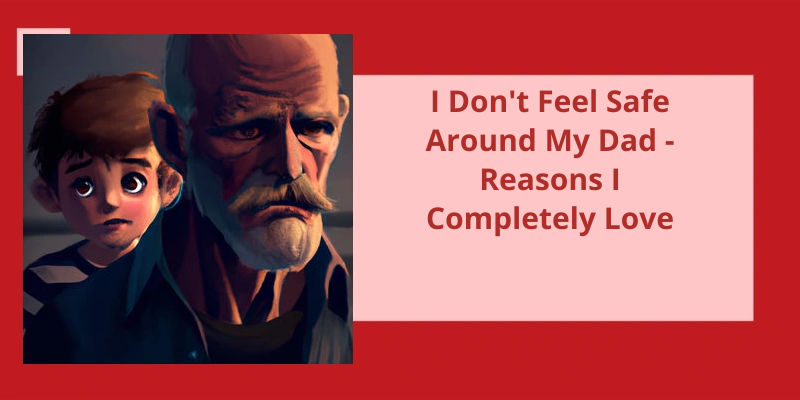In the intricate web of human emotions, there exists a contrasting amalgamation that can perplex even the most astute of minds: the coexistence of fear and love. And within the realm of familial relationships, this juxtaposition can be magnified to an unparalleled extent. For those caught in the labyrinthine complexities of feeling unsafe around a father figure, the spectrum of emotions can oscillate between trepidation and adoration. This delicate paradox invites a multitude of reasons and experiences that shape the bond between a child and their father, ultimately illuminating the intricate contours of our hearts. So, let’s embark on a journey of introspection, exploring the reasons why one may not feel safe around their dad, while simultaneously acknowledging the profound love that resides within.
What Do I Do if I Don’t Feel Safe Around My Dad?
If you find yourself in a situation where you don’t feel safe around your dad, it’s crucial to take your concerns seriously. Feeling threatened or worried about potential harm isn’t something to be taken lightly. It’s important to talk to someone you trust, such as another adult, about your fears and concerns. They can provide you with guidance, support, and help you in finding a solution.
Your emotions are important and shouldn’t be dismissed. It may be beneficial to reflect on specific incidents or behaviors that have led to these feelings. By understanding the reasons behind your concerns, you can better articulate and explain your situation to someone who can help.
It’s crucial to remember that not all situations are the same, and it’s possible that your worries might be unfounded. Sometimes, our fears can stem from misunderstandings or miscommunication. Identifying the source of your discomfort is an essential step towards resolving the issue at hand.
However, if you genuinely feel unsafe or believe that you may be at risk of abuse, it’s vital to seek help immediately. Your safety should always be a priority, and there are numerous resources available to assist you. Reach out to a trusted adult, teacher, counselor, or helpline to discuss your concerns confidentially. They can provide you with the necessary guidance and support to ensure your well-being.
Remember, addressing these concerns takes courage, but it’s an essential step towards ensuring your safety and creating a healthier environment for yourself. No one deserves to feel unsafe or mistreated, and seeking help is a courageous act that can lead to positive changes in your life.
Expressing love and affection is a deeply personal choice, and telling your dad you love him is no exception. While it may not be a mandatory gesture, there may be various individual perspectives or cultural considerations that shape this decision.
Is It Okay to Tell Your Dad You Love Him?
It’s absolutely okay to tell your dad you love him if you genuinely feel that way. Expressing love and affection towards your parents is a personal choice and shouldn’t be dictated by societal norms or expectations. However, it’s important to note that not everyone has the same relationship with their father, and there are valid reasons why someone might not feel comfortable expressing love towards their dad.
Family dynamics can vary greatly, and sometimes individuals may not have had a positive or nurturing relationship with their father. This could be due to emotional, physical, or even verbal abuse, which can create feelings of fear, resentment, or mistrust.
Cultural factors can also play a significant role in influencing someones decision to express love towards their father. In some cultures, openly expressing emotions, particularly love, may not be the norm. Cultural norms and expectations can differ widely, and it’s essential to respect and honor individual choices based on cultural backgrounds.
It’s crucial to prioritize your emotional wellbeing and only do what feels right to you. However, if you’ve valid reasons for not feeling safe or comfortable around your dad, it’s essential to prioritize your emotional well-being and seek support from trusted friends, family members, or professionals.
Tips for Building a Stronger Bond With Your Dad
Building a stronger bond with your dad is important for a healthy relationship. Here are some tips to help you strengthen your connection:
- Spend quality time together: Plan activities that you both enjoy and make an effort to spend time together regularly.
- Communicate openly: Share your thoughts, feelings, and interests with your dad. Honest and open communication can foster a deeper connection.
- Show appreciation: Express gratitude for the things your dad does for you. Small gestures like saying thank you can go a long way in building a stronger bond.
- Listen actively: Pay attention when your dad speaks and show genuine interest in what he’s to say. Active listening can help foster better understanding and connection.
- Support each other: Be there for your dad during both his successes and struggles. Offering support can help create a sense of trust and closeness.
- Respect boundaries: Understand and respect your dad’s personal boundaries. This can help establish a foundation of trust and mutual respect.
- Find common interests: Discover activities or hobbies that you both enjoy and engage in them together. This shared experience can deepen your bond.
- Be patient: Building a stronger bond takes time and effort. Be patient and understanding as you navigate your relationship with your dad.
By following these tips, you can work towards building a stronger and more meaningful connection with your dad.
Source: What makes it so hard to tell your dad “I love you”? – Shortlist
Everyone has the right to their own feelings and personal preferences, including their relationship with their father. It’s completely okay if you don’t like your father, and there may be underlying reasons contributing to these emotions. Exploring your childhood experiences and the possible connection to past pain could help you understand and address these feelings. However, it’s important to remember that you aren’t obligated to interact with your dad if you don’t want to. Finding acceptance and healing for yourself should be your priority in working through these emotions.
Is It OK if I Don’t Like My Father?
Is it OK if I don’t like my father? This is a question that many people grapple with, and the answer isn’t always straightforward. It’s important to remember that everyones experiences and relationships are unique, and it’s natural to harbor different emotions towards different individuals, including our parents.
If you find yourself disliking or even hating your dad, it may be helpful to explore the underlying reasons for these feelings. Sometimes, deep-seated childhood traumas or negative experiences can contribute to our current perceptions and emotions. It could be that certain events or behaviors from your past have shaped your relationship with your father in a negative way, making it difficult for you to feel safe or comfortable around him.
Acknowledging and accepting your feelings is an essential step towards finding healing and peace. It’s crucial to remember that you don’t have to force yourself into engaging with your father if you genuinely don’t want to. Prioritizing your emotional well-being and setting boundaries that protect your mental health is perfectly valid.
Ultimately, it’s crucial to remember that your feelings towards your father don’t define your worth or character. Our relationships with our parents can be complicated and multifaceted, encompassing both love and dislike. Your emotions are valid, and your well-being should always take precedence. Give yourself permission to prioritize your healing and growth, even if it means stepping away from a relationship that doesn’t serve you.
It’s important to recognize that generational gaps and differing perspectives can contribute to feelings of distance between a father and child.
Why Am I Distant With My Father?
Why am I distant with my father? This is a question that plagues my mind and heart, leaving me with a heavy sense of guilt and sadness. Growing up, all I ever wanted was to make my father proud, to live up to his expectations and be the child he envisioned. Yet, as the years went by, a distance formed between us, slowly and steadily. It’s a distance that’s left me feeling disconnected from him, unsure of how to bridge the gap that’s developed over time.
One of the reasons for this distance could be the overwhelming guilt of not living up to my fathers expectations. From a young age, I could sense the weight of his dreams and aspirations for me. It felt as if I was constantly falling short of his desires, and this left me feeling inadequate and unworthy. The guilt of disappointing him became a heavy burden to carry, and it pushed me further away from him, creating a chasm that seemed impossible to bridge.
Furthermore, Ive come to realize that some of this distance may be attributed to our differing beliefs and values. My father holds onto certain outdated beliefs, ones that clash with my own evolving perspective on life. These conflicting views have led to misunderstandings and tense conversations, causing us to retreat into our respective corners rather than finding common ground. The inability to see eye to eye on important matters has contributed to the distancing between us, making me question the depth of our connection.
Additionally, as Ive grown older, Ive noticed a sense of emotional distance from my father. Our interactions have become more superficial, lacking the genuine connection and intimacy that should exist between a parent and child. This emotional distance could be a result of various factors, such as our busy lives and the demands of everyday responsibilities. The lack of quality time and heartfelt conversations has contributed to the growing distance, leaving me feeling like a stranger in my own fathers presence.
It’s essential to acknowledge that this distancing isn’t solely one-sided. I’ve also played a part in creating this emotional gap. My fear of rejection and disappointment has led me to withdraw, to guard myself against potential hurt. This self-protective behavior has inadvertently pushed my father away, preventing any possibility of true closeness. Recognizing my own role in the distance is a crucial step towards healing and rebuilding our relationship.
The Role of Shared Hobbies or Interests in Building a Stronger Bond With a Father.
- Engaging in shared hobbies or interests can strengthen the bond between a father and child.
- Participating in activities together allows for quality time and meaningful interactions.
- Hobbies create common ground and facilitate open communication between father and child.
- Shared interests provide opportunities for fathers to mentor and teach their children.
- Engaging in hobbies together promotes teamwork, problem-solving, and cooperation.
- Having shared hobbies can lead to long-lasting memories and experiences.
- Participating in activities can build trust and create a sense of belonging.
- Shared hobbies allow fathers and children to connect on a deeper level.
- The bond formed through shared interests can positively impact a child’s self-esteem and emotional well-being.
When it comes to expressing love and appreciation for our fathers, there are various ways to convey our emotions without explicitly saying “I love you, Dad.” One meaningful approach is to cook something special for him, indulging his taste buds with a homemade meal made with love. Additionally, calling him often and engaging in conversation can help establish a deeper connection. Another way to express affection is by reading his dad jokes, showing genuine interest in his humor. Moreover, surprising him with flowers and thoughtful gifts can bring a smile to his face. Actions speak louder than words, so offering help and support without explicitly mentioning it can make a lasting impact. Making an effort to watch his favorite show, game, or movie together is another way to bond and spend quality time. Involving him in your life decisions and seeking his advice shows that his input is valued and respected. Lastly, acknowledging and giving him credit for his achievements and contributions can make him feel truly appreciated.
How Do I Say I Love My Dad?
Expressing love and appreciation for our fathers is an essential part of maintaining a healthy and loving relationship. However, finding unique and meaningful ways to convey these feelings can sometimes be a challenge. One heartfelt way to say “I love you, Dad” without actually uttering those words is by cooking something special for him. The act of preparing a delicious meal not only shows your love and care but also provides an opportunity for quality time together.
Another way to express your love for your dad is by making an effort to call him regularly. Taking the time to check-in, ask about his day, and engage in meaningful conversation demonstrates that you value and cherish your relationship with him.
Reading dad jokes is another lighthearted yet effective way to convey your love for your father. Laughing together not only strengthens your bond but also shows that you enjoy his company and sense of humor.
Nothing says “I love you” quite like giving flowers and gifts. Whether it’s for a special occasion or just to brighten his day, surprising your dad with a thoughtful present is a tangible way to express your love and appreciation.
Offering your help without explicitly saying the words is another way to communicate your love for your dad. Whether it’s assisting with household chores, running errands, or lending a helping hand in any way possible, your actions will speak louder than words.
Taking the time to watch your dads favorite show, game, or movie with him is an excellent way to show that you value his interests and enjoy spending time with him. Sharing these experiences together will create lasting memories and deepen your connection.
Involving your dad in your life decisions is a powerful way to convey your love and respect. Seeking his advice and guidance shows that you value his wisdom and trust his judgment, allowing him to feel valued and appreciated.
Lastly, giving your dad the credit he deserves is a fundamental way to express your love for him. Acknowledging his accomplishments, talents, and contributions not only boosts his self-esteem but also shows that you’re proud to have him as your father. Letting him know that you recognize his efforts and are grateful for his presence in your life is a beautiful expression of love.
Writing a Heartfelt Letter or Poem to Your Dad
Writing a heartfelt letter or poem to your dad can be a meaningful way to express your emotions and strengthen your bond. It provides an opportunity to convey your appreciation, love, and concerns in a personal and sincere manner. By sharing your feelings, you may find that it opens up a space for honest communication and understanding between you and your dad. Whether it’s to acknowledge his support, ask for guidance, or address any concerns you may have, a heartfelt letter or poem can be a powerful tool for emotional connection.
Conclusion
In conclusion, the complex and multifaceted nature of love leaves room for conflicting emotions and experiences. While feeling unsafe around one's father may cause distress, it doesn’t necessarily negate the deeply rooted love that can coexist within the same relationship. It’s important to acknowledge and address the reasons behind this unease, seeking understanding, growth, and healing in order to foster a healthier dynamic. Love, after all, can be fierce and unwavering, even in the face of adversity, as individuals navigate the complexities of their relationships with empathy, compassion, and self-care.






